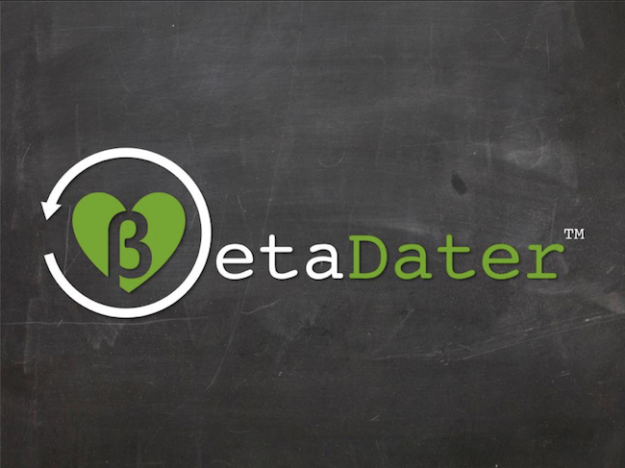
Going on a first date is monstrously terrifying. Will you hit it off? Will they notice your [insert flaw here]? What will you do during awkward silences? Is it going to seem picky if you tell the waiter you can’t eat gluten? What clothes will you wear to make yourself appear more attractive, tasteful, fun to be around? You’re probably getting anxiety hives just thinking about it. It’s like going on a job interview, which is also the worst, but the job is to LOVE EACH OTHER. High stakes, people.
Sometimes people think they overcame the odds and did great on a date, and then their love interest totally blows them off. This is much worse than just a straight up crappy date because at least then no one’s harboring the wrong impression. To combat the problem of the mystery blow-off and to make daters more self-aware of the way others see them, an engineer and economist teamed up to created BetaDater.
“Have you ever been on a first date that you thought went well, but never got a call back?”
BetaDater kind of seems like a speed dating service at first. But the insistence on analysis makes it something more interesting. After filling out an online assessment, you attend a meet-up and go on three 30 minute dates over the course of one evening. But the unique part about BetaDater is that these dates are encouraged to offer you honest feedback, and you to them.
The feedback is anonymized, so you won’t know exactly who said what – which might make it harder to figure out exactly who wasn’t feeling you, but it also offers people the opportunity to actually be honest instead of trying to be polite. BetaDater takes the feedback and aggregates it into a Dating Diagnostic that looks at your self-perception in comparison to your dates, and it offers you areas where you might be overestimating or underestimating yourself. You can indicate which of your dates you’d be interested in seeing again, and if they say they’d like to see you too, you’re both contacted.
Now, this sounds like a recipe to feel horrible about yourself, at least in the short term. Either you think you’re amazing, in which case any negative feedback will throw you for a loop, or you’re already aware that you have some flaws you need to work on, in which case any negative assessment will just cement the fact that you’re romantically challenged. Of course, maybe you think you’re the dating equivalent of Anthrax and then you get a bunch of positive feedback. But something tells me that’s not as common a scenario. That doesn’t mean going on BetaDater is a bad idea. If you’re ready to face some less-than-flattering truths about yourself, it could help you work on your weak areas so that your next venture into the dating world is more successful.
This kind of data-heavy approach to dating is strange because it encourages you to treat your romantic escapades like football players do their game film; scrutinizing the event for places where you fell short and hammering away at your weaknesses until you fix them. Then again, that might be exactly what you’re looking for at this point. It’s sort of a great online dating complementary tool, if you think about it – especially for anyone who feels like they’ve been paying fees for bad matches.
So who’s signing up for BetaDater. So far, very self-confident people. The Chief Empowerment Officer, Lauren Lyons, said it was too early for an in-depth assessment of the clientele, but one thing’s for sure: “Overall, there is one trend: single, young professionals in their late twenties to late thirties who know they’re fantastic, and are successful in many other aspects of their lives. Our theory is that this group of people are secure enough to seek out feedback, and self-aware enough to consider the possibility that the issue they may be having isn’t about their appearance etc. — that stuff is obvious — but actually something more subtle that no one else just hasn’t told them before.”
We discussed the possibility that BetaDater’s feedback will cause people to change their behavior to get nicer assessments. “You bring up a good point about people altering their behavior to get good feedback; and that’s exactly what we’re hoping for, particularly since there is the possibility that a person will not be attracted to their BetaDater partner, and be tempted to treat the date as a throwaway.”
“We’re interested in what happens when you’re trying really hard to impress the other person, because our theory is a) that is what’s going on when you you’re on a first date with someone awesome, and b) the feedback that concerns us most is from those dates with awesome people that don’t work out.”
An app is in the works to make the service more mobile-friendly, but Lauren said “The online component, as it exists today, mainly surrounds the self-assessment process and the diagnostic form delivery.”
If you want to check out BetaDater, right now it holds events in New York, San Francisco, and Washington, D.C. And interestingly, they’ve already noticed distinct patterns emerging in the three cities. In San Fransisco, for instance, they had a hard time finding women to participate — but in NYC, they had the opposite problem, with plenty of women but fewer men.
If you’re not in those cities you’ll just have to deal with feeling rejected the old fashioned way. But Lauren says other locations are already in the works, “We’ve been getting requests from all over the country — ranging from Los Angeles to Austin to Seattle — and as the notes continue to come in, we’ll follow the demand to the next city!”



